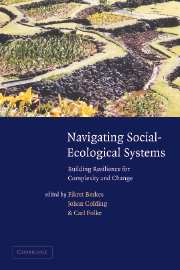Book contents
- Frontmatter
- Contents
- List of contributors
- Preface
- Acknowledgements
- Foreword: The backloop to sustainability
- 1 Introduction
- Part I Perspectives on resilience
- 2 Adaptive dancing: interactions between social resilience and ecological crises
- 3 Nature and society through the lens of resilience: toward a human-in-ecosystem perspective
- 4 Redundancy and diversity: do they influence optimal management?
- Part II Building resilience in local management systems
- Part III Social-ecological learning and adaptation
- Part IV Cross-scale institutional response to change
- Index
- References
4 - Redundancy and diversity: do they influence optimal management?
Published online by Cambridge University Press: 13 August 2009
- Frontmatter
- Contents
- List of contributors
- Preface
- Acknowledgements
- Foreword: The backloop to sustainability
- 1 Introduction
- Part I Perspectives on resilience
- 2 Adaptive dancing: interactions between social resilience and ecological crises
- 3 Nature and society through the lens of resilience: toward a human-in-ecosystem perspective
- 4 Redundancy and diversity: do they influence optimal management?
- Part II Building resilience in local management systems
- Part III Social-ecological learning and adaptation
- Part IV Cross-scale institutional response to change
- Index
- References
Summary
The command-and-control approach, when extended uncritically to treatment of natural resources, often results in unforeseen and undesirable consequences. A frequent, perhaps universal result of command and control as applied to natural resource management is reduction of the range of natural variation of systems – their structure, function, or both – in an attempt to increase their predictability or stability.
(Holling and Meffe, 1996: 329).Introduction
In many fields, there are fashions in favored approaches – what is assumed to be ‘best.’ A recurrent theme in American academia – particularly among students of public administration, policy analysis, and resource economics – has been to criticize ‘redundancy’ in government, decrying the number of governments that exist in the USA and the competition that exists among them. Consider education policy: beliefs that large numbers of schools were inefficient and that massive consolidation would be effective led to the reduction of ‘redundant’ school districts in a massive campaign during the first half of the twentieth century. In 1932, there were almost 130000 school districts in the USA. This number was halved by 1952 and quartered by 1962, and halved once again by the early 1970s. The massive consolidation of school districts has slowed down during the past two decades. However, today we have around 15000 school districts in the USA for a population that has almost doubled since the campaign to consolidate schools was initiated (see Ostrom, Bish, and Ostrom, 1988).
Information
- Type
- Chapter
- Information
- Navigating Social-Ecological SystemsBuilding Resilience for Complexity and Change, pp. 83 - 114Publisher: Cambridge University PressPrint publication year: 2002
References
Accessibility standard: Unknown
Why this information is here
This section outlines the accessibility features of this content - including support for screen readers, full keyboard navigation and high-contrast display options. This may not be relevant for you.Accessibility Information
- 13
- Cited by
